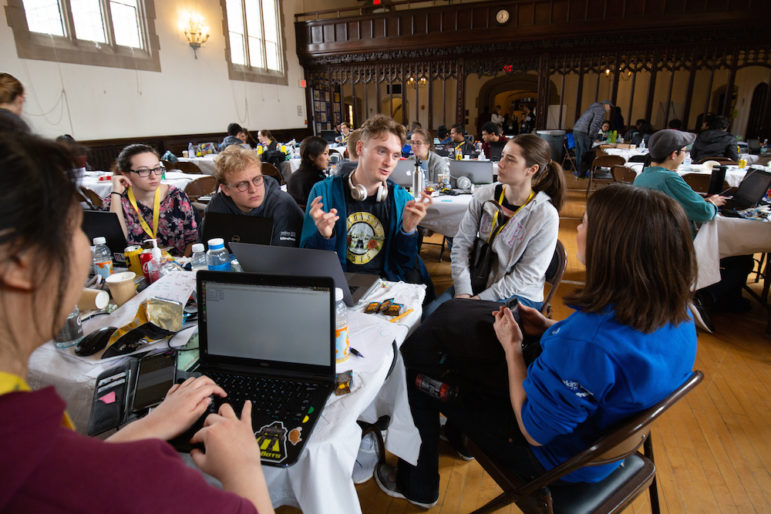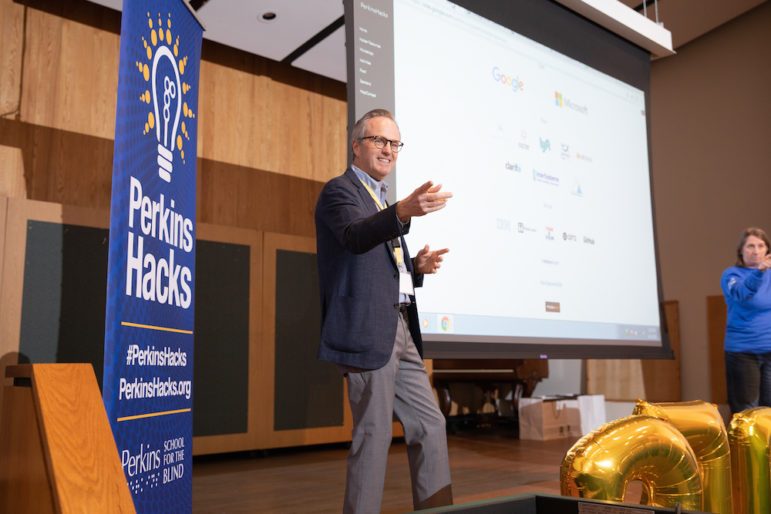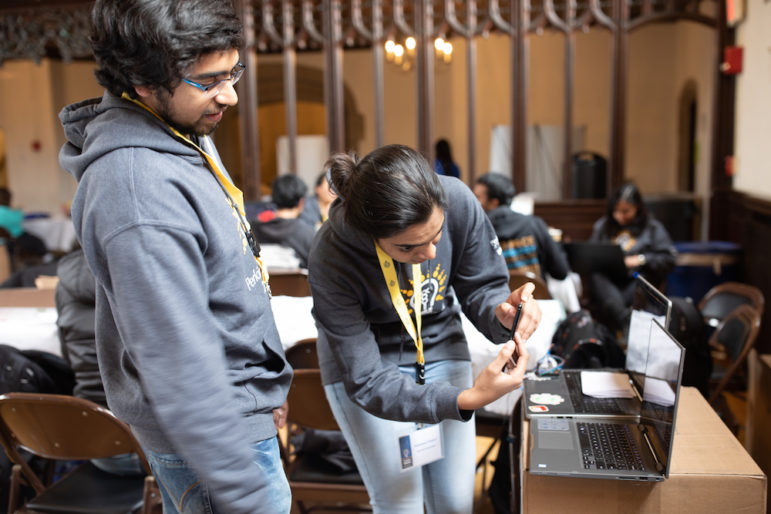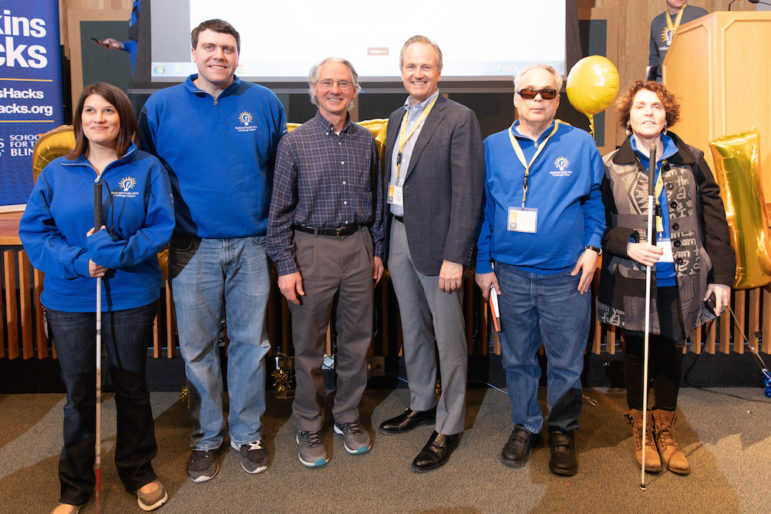
Perkins School for the Blind
Students attending the Hackathon were able to confer with “challenge experts” from the blind and low-vision community, including Kate Katulak, Assistant Director of College Success at Perkins School for the Blind. The experts acted as both mentors and a resource for students, who were tasked with developing tech-based solutions to the barriers faced by people with blindness and low-vision.
{The following report was provided by Perkins School for the Blind}
After 24 hours of non-stop problem-solving, collaboration and software development, Perkins School for the Blind crowned the winners of its first-ever hackathon on Saturday. The grand prize winning design, a tactile lever device that allows coders with visual impairment to feel what their data trends look like, was one of 22 entries from college students across the United States and Canada who gathered at Perkins’ campus to develop innovative tech-based solutions to problems facing the visually impaired community in work, education and daily life.
Throughout the event, more than 100 students worked in teams to solve one of six challenges inspired by the real-life experiences of blind individuals. A panel of expert judges scored the resulting designs.
Other prize-winning designs included accessible apps like SonifEye, which allows coders with visual impairment to hear changes in data; Seats, which helps students locate empty seats in a cafeteria; Ezform, which allows individuals who are blind to fill out paper forms electronically; OvenBot, which helps users locate buttons on a digital display; B-Fit, which connect people with visual impairment with “spotters” at the gym; and iSee, which provides information on dining hall menus and allows users to connect with friends.
PerkinsHacks, which was hosted in partnership with Major League Hacking, was an opportunity for students to sharpen their software development skills while learning from Perkins experts about the vital role of assistive technology in empowering people with disabilities to lead independent lives.
“Given our long history of innovation, Perkins is uniquely qualified to bridge the gap between the technology sector and the blindness community,” said Dave Power, Perkins President and CEO. “Too often, these worlds remain disparate. We want to show that innovators today have not only the opportunity, but the responsibility to prioritize accessibility in the design process.”

Perkins School for the Blind
Dave Power, President and CEO of Perkins School for the Blind, addresses the crowd at the closing ceremony of Perkins School for the Blind’s first-ever PerkinsHacks. The Hackathon welcomed over 100 students, who worked in teams to solve one of six challenges inspired by the real-life experiences of blind individuals.
Championing accessibility through technology has always been integral to Perkins’ mission. In January, Perkins became the first campus in the country to collaborate with the tech company Aira after piloting its new wearable technology that provides live visual assistance to individuals with blindness or low vision. And in fall of 2016, Perkins launched BlindWays, a free iPhone app that provides crowdsourced navigational clues to help bus riders with visual impairments locate outdoor bus stops more precisely. BlindWays was created via user-centered design, a methodology that places user needs and challenges at the center of product design and development.
That philosophy of user-centered design was in full swing at PerkinsHacks, where participants had the chance to ask blind mentors what it’s like to live with visual impairment.
“User input is crucial when you’re developing new products,” said Luiza Aguiar, Executive Director of Perkins Solutions, which offers digital accessibility consulting services and user testing. “It was a great opportunity for our hackers to spend time with blind individuals and really begin to understand the challenges they face in their day-to-day lives, at work, at school and elsewhere. That kind of collaboration is what leads to truly useful solutions.”

Perkins School for the Blind
Students spent a 24 hour period collaborating at Perkins School for the Blind’s first-ever Hackathon this past weekend, coming together with software designers and the blind community to develop innovative tech-based solutions to problems facing the visually impaired community in work, education and daily life.
Participants also benefited from the advice of experts well-versed in accessibility who coached teams during workshops as part of their event sponsorship.
“Time and time again, I am amazed and humbled by the ideas that are generated in hackathons,” said Jenny Lay-Flurrie, Chief Accessibility Officer at Microsoft. “Some of those ideas are now amazing products and solutions empowering people with disabilities around the world and embody the true spirit of inclusive design. Great to see the ideas that came out of the Perkins Hackathon! Game on.”
The event, which was free for student participants, was made possible with support from Major League Hacking as well as Gold sponsors Google and Microsoft; Silver sponsors Experimental Civics, iFactory, Lyft, Appirio, Annkissam, Clarifai, Kronos and InterSystems; and Bronze sponsors IBM, MakeLabs, Think & Zoom, Aira, GitHub and athenahealth.

Perkins School for the Blind
State Representative Jonathan Hecht of Watertown attended the closing ceremony at Perkins School for the Blind’s first-ever Hackathon. From left to right: Kate Katulak, Assistant Director of College Success at Perkins School for the Blind; Chris Nagle, Senior Software Engineer at Inmoji, Inc.; State Representative Jonathan Hecht of Watertown; Dave Power, President and CEO of Perkins School for the Blind; Jerry Berrier, iCanConnect program manager at Perkins School for the Blind and Manager in Massachusetts and Rhode Island at Deaf-Blind Equipment Distribution Program; and JoAnn Becker, Assistive Technology Support, Training and Testing Specialist at Perkins School for the Blind.
ABOUT PERKINS SCHOOL FOR THE BLIND
Since 1829, Perkins’ global mission has fostered access and inclusion through education. We are committed to preparing our students for the world – and the world for our students – because we believe every person can maximize their independence and fulfill their unique potential. Learn more at Perkins.org.
